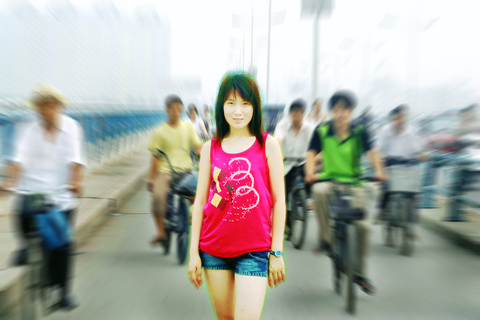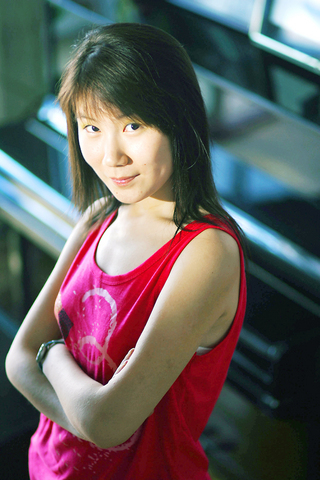Dai Yichen is in the third row, far right side, her feet kicking and scraping against the wood floor with other students in her tap dance class. The rehearsal hall fills with a noise as pounding and repetitive as a hailstorm.
Yichen is lanky and a little awkward. She sidesteps and thrusts her shoulder in a suggestive move that no one in the class gets quite right. But she keeps trying. As the teacher calls forward different lines of dancers, Yichen stands off to the side, practicing her footwork. She watches herself, unsmiling, in a floor-to-ceiling mirror that betrays every stumble.
Her dream is to one day perform on a Chinese equivalent of Broadway, though one does not yet exist.

Yichen, 17, is one of 30 students at a private fine arts school on the outskirts of Beijing who are far removed from the days when Mao demanded that culture serve the Communist Party. They are studying how to perform in US-style musicals, an academic major about as improbable as American teenagers dedicating themselves to Peking Opera.
It is an example of the changes engulfing China that a teenager like Yichen has been far more influenced by the musical Cats than by the Communist Youth League. While China is far too vast and divided between rich and poor for any one teenager to be considered typical, Yichen is representative in that her generation is expected to have opportunities unlike any before them.
But those opportunities bring pressure. Yichen's parents are among the new class of urban professionals who can afford to indulge their daughter's passion. Her mother is a journalist at a cultural newspaper. Her father is a businessman. The fine arts boarding school Yichen attends is an unimaginable chance for the overwhelming majority of Chinese students, whose families cannot come close to paying the annual tuition of US$4,000, almost four times China's per capita income.

PHOTOS: NY TIMES
"It is hard for me to describe how I feel when I sing, but I'm completely devoted to it," she said of why she wanted to enroll. "My teacher says I'm always lost in my song."
Her mother, Gao Xiaoli, who unwittingly sparked her daughter's interest by bringing home videos of Cats and other Broadway shows, understands that China, even as it becomes more affluent, is not an indulgent country. The transition to a market economy has brought rising incomes and choices, but also fierce, unblinking competition.
"There are so many singers studying in this country now," Gao said. "You have to be very good."
Anyone outside China would not hesitate in labeling Yichen's generation. They are the first to come of age in the aftermath of the government's violent repression of protesters at Tiananmen Square in June 1989.
That event seared China and still influences how the country is perceived by the outside world. But for many teenagers like Yichen it is an invisible marker. Media discussion of the crackdown is banned, as the government has tried to blot out that incident from history.
Yichen would have barely been a year old at the time. "I've never heard of it," she said quietly.
Instead, the day that transformed her life came when she was 4 and her parents divorced. Divorce was a rarity then, and Yichen instantly became different from her peers.
"My friends told me I should try to bring them back together," Yichen recalled. "But I never dared speak of it, and my mother wouldn't hear of it. I sometimes envied friends with two parents."
Yichen is no longer a rarity. She said nearly half the students in her class were from divorced families. Many of their parents broke up after the government loosened laws to make divorce far easier.
"Yichen is a very innocent child, and it is probably too early to explain it to her," Gao said. "I will when she gets to the age where she can fall in love and get married."
If the Chinese government still tightly controls political speech, the media are now filled with entertainment news. The lives of Taiwanese pop singers or Chinese soccer stars fill newspapers. Celebrities adorn buses, billboards and packages of crackers.
Yichen first thought her path into that world would be through modeling. She spent three years at a modeling school before concluding that she was not tall enough and had slight imperfections in her skin.
She started school late, and despite her age, she will be entering 10th grade this fall. Her plans now include finishing high school and applying to Beijing's top conservatory. Then, possibly, she would like to study in the US or Europe. If musicals do not work out, she says she might try singing pop songs.
None of it will be easy. Her class recently held auditions for a musical staged on state television. She auditioned for a leading role but lost the part because her teacher thought she was too passive. "I cried and cried," she said.
School dominates her daily life. She begins classes at 6:45am, breaks for meals and concludes at 8:20pm. Her spare time is spent studying. But when she does have a free moment, she goes with friends to karaoke clubs to sing, as if they were the stars they aspire to become. She paints three of her fingernails yellow and grimaces when asked why she doesn't paint them all.
Unfashionable, she answered.
In many ways she is the innocent her mother describes, or perhaps just a typical teenager. She said she pays no attention to politics and has never thought about joining the Communist Party. She also sounds very traditional when asked what she thinks she must do to succeed in the new China.
"As long as I study hard and love my parents, I'm quite content with what I have," she said. She added, "My mother's expectations are high. She wants me to grow into a person with talent and education, with manners and a career."
One thing she has not done for her mother recently is sing. But when asked to sing for a foreign reporter, the quiet, unassuming girl did not hesitate. She first sang in English and blushed when she stumbled on some of the lyrics. But when she sang a Chinese pop ballad, her voice filled the empty rehearsal hall with a clear, lovely sound. She was lost in her song.

On April 26, The Lancet published a letter from two doctors at Taichung-based China Medical University Hospital (CMUH) warning that “Taiwan’s Health Care System is on the Brink of Collapse.” The authors said that “Years of policy inaction and mismanagement of resources have led to the National Health Insurance system operating under unsustainable conditions.” The pushback was immediate. Errors in the paper were quickly identified and publicized, to discredit the authors (the hospital apologized). CNA reported that CMUH said the letter described Taiwan in 2021 as having 62 nurses per 10,000 people, when the correct number was 78 nurses per 10,000

As we live longer, our risk of cognitive impairment is increasing. How can we delay the onset of symptoms? Do we have to give up every indulgence or can small changes make a difference? We asked neurologists for tips on how to keep our brains healthy for life. TAKE CARE OF YOUR HEALTH “All of the sensible things that apply to bodily health apply to brain health,” says Suzanne O’Sullivan, a consultant in neurology at the National Hospital for Neurology and Neurosurgery in London, and the author of The Age of Diagnosis. “When you’re 20, you can get away with absolute

May 5 to May 11 What started out as friction between Taiwanese students at Taichung First High School and a Japanese head cook escalated dramatically over the first two weeks of May 1927. It began on April 30 when the cook’s wife knew that lotus starch used in that night’s dinner had rat feces in it, but failed to inform staff until the meal was already prepared. The students believed that her silence was intentional, and filed a complaint. The school’s Japanese administrators sided with the cook’s family, dismissing the students as troublemakers and clamping down on their freedoms — with

As Donald Trump’s executive order in March led to the shuttering of Voice of America (VOA) — the global broadcaster whose roots date back to the fight against Nazi propaganda — he quickly attracted support from figures not used to aligning themselves with any US administration. Trump had ordered the US Agency for Global Media, the federal agency that funds VOA and other groups promoting independent journalism overseas, to be “eliminated to the maximum extent consistent with applicable law.” The decision suddenly halted programming in 49 languages to more than 425 million people. In Moscow, Margarita Simonyan, the hardline editor-in-chief of the